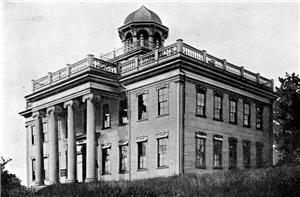During January 1874, a “colored” (African American) student attends the winter session of the University of Washington. Some white parents complain to the Board of Regents for allowing “colored” children to take classes at the university. One “very ardent and active Republican politician” withdraws his children from the University. In response, Beriah Brown (1815-1900), editor of the Puget Sound Dispatch, defends civil rights: "Every child of African descent born in this country has the same right of access to our public schools as the children of the most privileged of Caucassian [sic] blood. No teacher or school officer has any more legal right to exclude one than the other."
The University of Washington, located in downtown Seattle between 3rd Avenue and 5th Avenue and between Union Street and Seneca Street, was open to all students in primary, secondary, and college level study. The names of the student and the Republican politician are not known.
A Defender of the Law
Beriah Brown, editor of the Puget Sound Dispatch, reported the incident under the headline “Civil Rights”:
“… The paramount law of the land quarantees [sic] to every colored citizen all the civil, social and political rights secured to any white citizens under the same conditions. Every child of African descent born in this country has the same right of access to our public schools as the children of the most privileged of Caucassian [sic] blood. No teacher or school officer has any more legal right to exclude one than the other. If there is a right of discrimination it is in favor of the colored person. … Under the Civil Rights act of Congress, to exclude a colored pupil on 'account of race, color or previous condition of servitude,’ is a misdemeanor, to be tried by Federal Courts, and punishable by heavy penalties. All good citizens are bound to obey the laws, and whoever rejects the advantages offered by the Government for the education of his children, upon the ground that those advantages are shared by colored children, to be consistent, would reject the plan of salvation and his hopes of Heaven on the same account.”
The Weekly Intelligencer, the other Seattle paper, made no mention of this incident and the Puget Sound Dispatch published no follow-up article. No doubt the black student continued attending the school: If the University of Washington had reversed itself, it is likely that Beriah Brown would have reported it.

